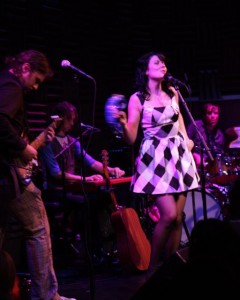 It’s your third album. You’ve written and performed songs that recall the best tunes from simpler, more fun times, yet they reveal true songwriting talent and a desire to do more than flog the studio gimmick of the moment. You’ve also somehow found yourself working with pop-music gurus Mike Viola and Adam Schlesinger. If all of this strikes you as oddly familiar, you might just be Kelly Jones, and at this moment Popdose is catching up with you.
It’s your third album. You’ve written and performed songs that recall the best tunes from simpler, more fun times, yet they reveal true songwriting talent and a desire to do more than flog the studio gimmick of the moment. You’ve also somehow found yourself working with pop-music gurus Mike Viola and Adam Schlesinger. If all of this strikes you as oddly familiar, you might just be Kelly Jones, and at this moment Popdose is catching up with you.
Popdose: You’ve just released your third CD, SheBANG! and you’ve found yourself in this pretty impressive pop collective, considering Mike Viola, Adam Schlesinger, Ducky Carlisle and the people they’ve worked with. How did you come together with them?
Kelly Jones: It all started very organically with Adam Schlesinger.Á‚ Sometime in 2004 while out to see a show, I recognized him and introduced myself.Á‚ I had only discovered Fountains of Wayne in 2002 or 2003 so I was very excited to say hello and gush over his music.Á‚ We exchanged info and I visited his studio (Stratosphere Sound). He came and watched me perform, and we became friends!Á‚ Then sometime in 2007, he introduced me to Mike Viola.Á‚ Coincidentally Mike and I were both playing the same night at the Living Room in NYC.Á‚ I saw the tail end of Mike’s set and was hooked.Á‚ I thought he was brilliant.Á‚ He had another show the following week so I went to that and we chit-chatted afterward and also became fast friends.Á‚ I started sitting in with him during his sets and the more we worked and sang together the more I decided he would be the perfect producer for the pop record I wanted to make.Á‚ Then I met the famous Ducky Carlisle when we traveled to Medford, Mass. for our first recording session at (his studio) Ice Station Zebra…
Could you give a little background on your career so far and what brought you to this point?
I’m originally from a small town just north of Portland, Oregon.Á‚ As a child/teenager, I was a dancer and trained in classical piano.Á‚ I moved to New York City in 2003 to get closer to the action and decided it was my chance to really pursue a life in music.Á‚ I completed my first record called Brave Heartache at the end of 2003. Á‚ it’s alt-country for lack of a better term.Á‚ Country music was one of the genres I was most familiar with growing up and went hand in hand with gospel music which I sang a lot of in church.Á‚ It seemed to be the natural first step for me as I was writing my first songs and I think it served me well at the time. After completing that record, I got a great band together here in NYC (which I still work with), we started playing a bunch of shows and I started to build a little following.
 SheBANG! doesn’t sound so much like a throwback to early ’60s pop as it seems to embrace the elements of ’60s pop with a modern sound. How difficult is it to write in this manner or is that just a natural process with you? What was the co-writing process with Mike like?
SheBANG! doesn’t sound so much like a throwback to early ’60s pop as it seems to embrace the elements of ’60s pop with a modern sound. How difficult is it to write in this manner or is that just a natural process with you? What was the co-writing process with Mike like?
It feels very natural to write songs that are reminiscent of the ’60s song form.Á‚ So many of those songs are amazing and memorable!Á‚ They’re the type of songs that both Mike and I gravitate to naturally, so it makes a lot of sense that they would come out in our songwriting both as a duo and independently.Á‚ That doesn’t mean we didn’t do some deliberate research — both of us wanted to be aware of what the ’60s female pop artists were doing. Billie Davis was a cool discovery.
I suppose an obvious question is that as good as the CD is, it’s not what the standard audience is used to from a modern pop album. Did you ever feel a need to flirt with a more commercial sound, if only for the sake of visibility? Or was the main point of the recording always to focus on very direct, hook driven pop tunes without concern for momentary studio gimmicks?
The modern pop music that’s on the radio today isn’t my style… Neither is the scene that often surrounds the mainstream industry (generally speaking). Though I believe that there are some talented artists succeeding in that world, I’ve found that to achieve success today, you need to meet a variety of non-musical standards that I don’t care to meet.Á‚ I don’t share our country’s infatuation with celebrity or stereotypical beauty or image driven music so it isn’t what I strive for.Á‚ However,Á‚ I believe performers and writers and artists should pursue whatever makes them feel fulfilled.Á‚ That’s different for everyone.Á‚ Whether that’s commercial success or artistic success (or both!)Á‚ We’re all human and trying to find meaning in what we do…
Your sound reminds me of a mix between Shawn Colvin andÁ‚ Indescribable Wow -era Sam Phillips, particularly on the track “I Can’t Help You.” What are your influences?
Shawn Colvin is amazing.Á‚ Listening to A Few Small Repairs several years ago was a watershed moment for me, and I’ve listened to early Sam Philips only now since I’ve received so many comparisons to her!Á‚ I love her track “Baby I Can’t Please You” Á‚ and “I Need Love.”Á‚ For SheBANG! I wanted positive, happy-sounding, classic pop songs:Á‚ The Bangles, The Beatles (duh), my dad (he suggests song titles for me), Petula Clark, Kirsty MacColl… (Mike Viola, Fountains of Wayne!) Maybe our greatest influences are the ones in our lives, sitting outside our front door.
When I heard “There Goes My Baby” I immediately flashed on Colvin’s “Round Of Blues,” which is odd. The songs are not similar at all, and yet the approach is. As a matter of fact, almost all the songs on SheBANG! start with a very simplistic idea or thought but expand as they go along. For instance, what starts as a simple “boy meets girl” kind of tune becomes a bit deeper as the song goes along. Do you consciously try to make that happen, or is that again just how you write?
That isn’t a conscious choice.Á‚ I’m not even really sure how to respond!Á‚ I tend to like simple themes and I guess as I go along writing, it just naturally develops into something with more layers.Á‚ The good songs, anyway.
Has the decision to focus on one specific sound rather than being, as you said, all over the map, been easy? Have you had to step back during a writing phase and say, “This is good, but not for now”?
Deciding to focus on a pop sound for my third record was easy,Á‚ I’d say. I was already almost completely in that mindset.Á‚ I did have some more “rootsy” sounding songs that I liked at the time too, but they just weren’t appropriate.Á‚ I’m sure they’ll resurface again at some point.
I seemed to glean from your older site that there was difficulty in your move to NY, that there was a little trepidation initially. Would you care to elaborate and, afterward, have you found the experience constructive in your songs?
I wouldn’t say there wasÁ‚ trepidation.Á‚ On the contrary, I was really excited to move to New York!Á‚ But there were and still are ups and downs.Á‚ Living in a city like New York, you’re constantly being pushed.Á‚ This can feel either invigorating or exhausting depending on the day.Á‚ And yes…Á‚ I think being in NYC has been very good for my artistic pursuits.Á‚ I’ve been stretched as a person and have met a lot of talented people who have inspired and challenged me.
When is the new site going to be ready to roll (www.kellyjones.com)?
Not sure.Á‚ I’m still trying to figure out what my site should do now that MySpace and Facebook are so popular.
When you play live, have you tweaked your older songs into newer arrangements, kept them as/is or kept them off the setlist?
I haven’t been playing my older songs.Á‚ Right now, we’re just playing SheBANG! and some stray songs of mine that haven’t been recorded yet.
 SheBANG! is out through Mike’s Good Morning Monkey label, which is a personal indie label, but all your releases have been independent. Has that been good for you, difficult, or just the nature of a modern music career?
SheBANG! is out through Mike’s Good Morning Monkey label, which is a personal indie label, but all your releases have been independent. Has that been good for you, difficult, or just the nature of a modern music career?
It hasn’t really made any difference, to my knowledge.Á‚ I don’t have a “record deal” with Good Morning Monkey.Á‚ Mike and I just decided to put the logo on there so it had a little more identity associated with it.Á‚ It made sense, since Mike produced it.
While living in New York is conducive to being a part of what is, arguably, one of the biggest American music scenes, it occurs to me that standing out must be a little more difficult because there’s just so many people there making music. What are your thoughts on that?
A lot of people have opposing ideas about “how to get discovered” as an artist. Some people think it’s good to live in an industry town like NYC or LA or Nashville because you have so many music biz people lingering about, on the look-out.Á‚ Other people think it’s better to live in a smaller city and become a big fish in a small pond.Á‚ I don’t really know.Á‚ I’ve seen talented people succeed and remain anonymous in both scenarios!Á‚ I don’t think there’s a formula.Á‚ I moved here 6 years ago and remain here because it’s an inspiring place for me to live.Á‚ That might change as time goes on. Á‚ The most important thing is to make good music and be a healthy person, I think.Á‚ With the internet today your physical whereabouts matters less and less, but making honest, interesting, compelling music is as important as it’s ever been. Á‚ if you’re doing that, people will have to take notice at some point.
What are your live show plans for the next few months? What’s in store for writing and recording (I know; isn’t it a little too soon to move onto the next record?)
I’ll be playing more shows with Mike – singing and playing bass (NYC, LA). We’llÁ‚ probably have some one-off SheBANG! shows in NYC.Á‚ I’m also playing some shows with Brian Blade, singing and playing guitar.Á‚ We’re going to Japan in July and playing the Highline Ballroom in New York on June 24th.
All of august, I’ll be in Paris writing for my next record (never too soon to think about the next record!). I hope I’ll having something out by late spring of 2010.
Well, it’s been great talking with you. All the best to you and SheBANG!
Glad to do it! Thanks, Dw.
_________________________________
SheBANG!![]() is available at Amazon.com.
is available at Amazon.com.

![Reblog this post [with Zemanta]](http://img.zemanta.com/reblog_e.png?x-id=643b1a1b-ed05-45c5-975e-e8df29120569)



Comments